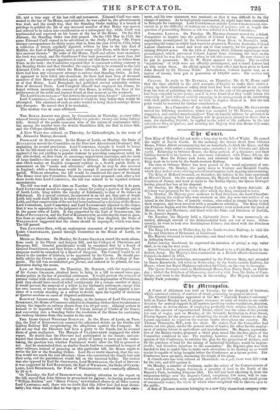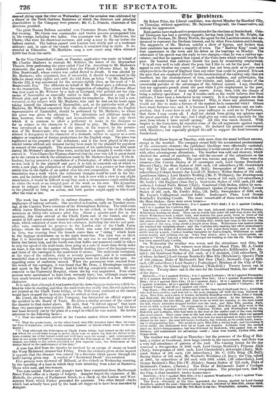Zbe Iftetropolio.
A Court of Aldermen was held on Tuesday, for the despatch of business; which consisted entirely of matters of detail, possessing no general interest. The Central Committee appointed at the late " National Trades Conference," held on Easter Monday last, to prepare measures to unite all trades in one confe- deration for mutual support in all matters involving trades-regulations, disputes, and strikes, to devise means of employing profitably their surplus funds, and to reduce the amount of superabundant labour, which was the cause of the present low rate of wages, met on Monday, at the Scientific Institution in John Street, Fitzroy Square, for the purpose of submitting the result of their labours to the de- legates appointed to represent the various trades throughout the country. Mr. Thomas Duncombe, M.P. took the chair. He stated, that the Committee had drawn out two plans, one for the general union of trades, the other for the employ- ment of surplus labour in agriculture and manufactures. Mr. Rogers, representa- tive of the Bristol trades, proposed a third plan, much like the two plans of the Committee combined in one. The meeting, however, resolved, "That in the opinion of this Conference, to combine the plan for the protection of strikers, and for the purchase of land for the raising of industrial buildings, would be imprac- ticable, and therefore injurious to the association." Mr. Rogers's plan was then handed to him to enable him to make such alterations in its drawing up as would render it capable of being brought before the Conference at a future period. The Conference have sat dairy, discussing the details of the plans.
A church-rate has been refused at Shoreditch: on a poll, there were 220 vote% for the rate, and 678 against it.
On Monday, a number of workmen, under the orders of the Commissioners of Woods and Forests began fencing-in a quantity of land to the North of the Regent's Park, including Primrose Hill. The hllf and land adjoining it, from the suspension-bridge over the Regent's Canal, comprising 150 acres, will be con- verted into plantations, with serpentine and other gravel-walks, and small pieces of ornamental water; the whole of which when completed will be thrown open to the public.
A fleet of Thames steamers belonging to a new City steam-boat company can-
'fenced plying upon the river on Wednesday; andthe occasion was celebrated br a dinner at the flvoli Gardens, Battersea at which the directors and principal: shareholders in the Company were present ; Mr. C. L. Francis, chairman of the directors, presided.
The great Nassau Balloon ascended ram Cremome House, Chelsea, on Mon day evening. Mr. Green was commander and twelve persons accompanied him in his voyage, including two ladies. One passenger was Mr. T. Matthews, the Clown; who wore his theatrical costume, and sang a song in the car before the balloon started. The balloon passed over London very slowly and at a moderate altitude; and,. in spite of the cloudy weather, it remained long in sight. It de- scended at Edmonton. Mr. Matthews sang a new comic song when elevated 3,000 feet from the earth.
r. the Vice-Chancellor's Court, on Tuesday, application was made on behalf of Mr. Charles Mathews to restrain Mr. Webster, the lessee of the Haymarket Theatre, from performing the piece called Used Up. According to Mr. Mathews's statement, the piece was translated from the French L'Ilomtne Blase, by Mr. Dion Bourcimnit, whose version was called Bored to Death. It was altered by Mr. Mathews; who stipulated, that if successful, it should be announced in the bills for about sixty nights and until the 22d June, as being "by Mr. Mathews." Onsthe 22d, it was announced for the seventy-eighth time, as the work of " Boureicault, Esq." The affidavits on behalf of Mr. Webster gave a different turn to the transaction. They stated that the suggestion of adapting L'Homme Blase was first made to Mr. Webster by a lady at Liverpool, who pointed out the cha- racter of Nantouillet as especially suited to him. He procured a copy of the French play, and gave it to Mr. Bourcicault for translation. But he had a con- versation on the subject with Mr. Mathews, who said he had set his heart upon taking himself the character of Nantouillet; and, at the particular wish of Mr. Mathews, Mr. Webster consented that the character of Coldstream, the English representative of Nantonillet, should be performed by Mr. Mathews; to whom the piece was given for alteration. The alterations and additions made by him, however, were very trifling and inconsiderable, and in fact only those which it is common to allow aperformer to make in the dialogue so far as relates to the character lie is himself to play. Mr. Itlathews's name was introduced as the author of the piece, at his request, by the permis- sion of Mr. Bourcicault; who was not anxious to appear, and, indeed, con- sidered it derogatory to the ammeter of a dramatic author to appear as a mere adapter or translator of foreign productions for the English stage. The piece was registered as the property of the defendant; and it has been played in the pro- vincial towns without any demand having been made by the plaintiff for payment in respect of the copyright. The announcement of his authorship was first made during Mr:Webster's absence from town and he had not thought it worth while to correct it. Vice-Chancellor Wigrarn observed that the case was left in great doubt as to the extent to which- the alterations made by Mr. Mathews had gone. If the de fendant, having procured a translation of a French play, of which he could make no use, took it to the plaintiff and gave it to him as materials out of which to write a new play, the production of theplaintiff might to a greater or less degree entitle him to the rights of an author over his own composition. If the original translation was a work which the defendant thought could be used in his the- atre, and he desired the plaintiff merely to look it over with a view to any slight emendation, it would be difficult to say that such a circumstance could entitle him to claim the work or an integral part of the work as his own. The injunction must be refused; but he would direct the motion to stand over, with liberty to the plaintiff to bring an action, and both parties might apply to this Court after the trial at law.
The week has been prolific in railway disasters, arising from the culpable negligence of railway servants. One occurred in London, early on Tuesday morn- ing, at the Camden Town terminus of the Birmingham Railway. The mail-train which leaves Birmingham at five minutes to one o'clock, is due at the London terminus at thirty-two minutes after five. About a quarter-past flee in the morning, this train arrived at the Chalk Farm end of the tunnel, and pro- ceeded at full speed onwards towards the platform at the Camden station. The train, which consisted of more than ten carriages, including the tracks and post- office vans, continued its progress to the London side of the Chalk }arm bridge; where the down luggage-train, which was some few minutes behind its time, was crossing from the branch curve lines or " siding " which leads to the luggage storehouses on to the main down-line. The mist was so thick that it is described as utterly impossible for any one to see beyond twenty or thirty feet before him, and the result was, that before any measures could be taken to stop the speed of the mail-train, then going at a rate of more than thirty miles an hour, it ran into the luggage-train, literally dashing three of the luggage-vans and three of the carriages in the mail-train to atoms. The mail-train contained, at the time of the collision, sixty or seventy passengers; and it is considered wonderful that at least twenty or thirty persons were not killed on the spot. An appalling scene of confusion ensued. When the passengers were rescued from the wreck of the carriages, it was found that Mr. Dean, a Birmingham engineer and agent to the Earl of Devon, had his left leg completely crushed. He was removed to the University Hospital, where the leg was amputated. Four other persons were ascertained to have been seriously hurt; but, although many were very much bruised and cut with the glass, their injuries were of a less alarming character.
It is said, that although it was known that the down luggage-train was a little be- hindits time in starting, and that the mail-train was nearly due, the red signal was not hoisted at the Chalk Farm bridge, or the Policeman stationed at the tunnel would have stopped the up-train upon its arrival at that point.
Mr. Creed, the Secretary of the Company, has forwarded an official report on the accident to the Board of Trade. He gives a similar account of the cause of the disaster to that stated above. He says, that "it did not appear" that more than two passengers were injured; Mr. Dean, and a gentleman who had Ids face and head severely cut by the glass of a coupe' in which he was seated. He invites attention to the following facts-
1. That the mail-train arrived at the Camden station fifteen minutes before its time.
"2. That the goods-train, on the other hand, was fifty minutes later than its regu- lar time of departure, (owing to the unusual number of trucks which were to be con- InTed.)
3. That although the Policeman at Chalk Farm bridge had turned on the rod sig- nal when the goods-traln begau to move, there was so much fog that the driver of the train coining out of the tunnel could not well have seen the signal ; and, consequently, that in not going forward to communicate with the Policeman at the South end of the tunnel, according to the orders provided for this especial case, the Policeman at the bridge tidied in the performance of his duty."
A MED has died from the injuries he received by an escape of steam on board the 1Vasp Richmond steainerlast Friday. From the evidence given at the inquest it appears that the disaster was caused by a fire-tube which passes through the boiler having given way. A verdict of "Accidental Death" was returned.
Five persons were drowned off Milbank, at five o'clock on Wednesday morning, By the upsetting of a boat in which they were returning from a fair at Battersea. 'Three were men, and two women. Two men named Parker and Aungier have been committed from Marlborough Street Police-office on a charge of forgery. Aungier forged the signature of Mr. Nicholls, the printer, of Parliament Street, to a check on the London and West- minster Bank, which Parker presented for payment. Two other forged checks which had actually been paid by the bank are suppmed to have been executed by Aungier.



























 Previous page
Previous page